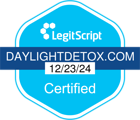Addiction treatment is a challenging process requiring individuals to make significant lifestyle changes, which can be overwhelming for many. While it is crucial to have a supportive environment, it’s equally important to have coping strategies in place to take control of the recovery journey. At the Daylight Recovery Center, a premier addiction treatment center in Florida, patients learn valuable coping skills to manage their addiction and stay on track to a lasting recovery.
Mindfulness Techniques
One effective coping strategy during addiction treatment is the practice of mindfulness which is the practice of focusing on the present time and acknowledging thoughts and emotions without judgment.
Incorporating mindfulness into daily routines can be beneficial to those in recovery. It helps individuals develop an awareness of their thoughts and feelings, leading to a better understanding of triggers and cravings. Additionally, practicing mindfulness techniques can improve self-awareness and reduce anxiety and depression.
At the Daylight Recovery Center, patients learn various mindfulness techniques, including meditation, breathing exercises, and yoga. These techniques help individuals reduce stress and increase their ability to remain present at the moment. Additionally, practicing mindfulness allows individuals to develop self-control, which is essential during addiction treatment.
Exercise and Nutrition
Exercise and nutrition play an important role in addiction treatment. Regular exercise can help individuals manage stress, reduce cravings, and improve mood. At the Daylight Recovery Center, patients participate in various physical activities, including yoga, hiking, and gym sessions. In addition to exercise, nutrition is a crucial aspect of addiction treatment. Patients receive education on healthy eating habits, and meals are prepared with fresh and nutritious ingredients. A healthy diet can help individuals feel better physically, emotionally, and mentally, which is crucial during addiction treatment.
Support Groups
Support groups are an essential component of addiction treatment. Attending support groups allows individuals to connect with others who have similar experiences and struggles. This helps to reduce feelings of isolation and promotes a sense of community. Additionally, support groups can provide individuals with accountability and encouragement, which is crucial during recovery.
Psychoeducation
Psychoeducation is a type of therapy that provides patients with educational information about the nature of addiction, how substances affect the brain and body, how to cope with cravings, and more. Psychoeducation helps individuals understand the underlying causes of their addiction and encourages them to take responsibility for their recovery. It also provides the necessary tools and skills to change their lives.
Cognitive Behavioral Therapy (CBT)
Cognitive behavioral therapy is an evidence-based approach that seeks to identify unhelpful thinking and behavior patterns, challenge them, and replace them with healthier alternatives. It can also help individuals realize how their environment has contributed to their substance abuse and how they can make changes to better manage their thoughts, feelings, and behaviors. CBT helps individuals recognize the connections between their thoughts, feelings, and behaviors to develop new ways of thinking that support healthier choices.
Contingency Management (CM)
Contingency management is an evidence-based intervention that utilizes rewards and consequences to help individuals change their behavior. CM helps individuals learn how to manage their behaviors by providing reinforcement for healthy choices and disincentives for engaging in substance use.
This approach can be an effective way to motivate people to make changes in their lives as it provides tangible rewards for achieving goals related to abstinence from drugs or alcohol. For example, an individual may be given tips for successful urine test results or attending treatment sessions. In addition, CM is beneficial for addressing issues related to relapse.
Motivational Interviewing (MI)
Motivational interviewing is an evidence-based approach that uses a client-centered approach to help individuals make changes in their lives. It is based on the idea that individuals are more likely to make positive changes when they feel empowered and supported rather than judged or coerced. MI aims to help people explore and resolve ambivalence about making a change and identify strategies for achieving their goals. During an MI session, practitioners use open-ended questions, reflective listening, and affirmations to help the client move from ambivalence to action.
Some techniques used in MI include exploring one’s motivation for making a change, identifying barriers to achieving goals, creating an action plan, and providing positive reinforcement. This approach is effective in helping individuals sustain changes over time and in a variety of settings. One of the essential aspects of MI is the emphasis on building a collaborative relationship between the practitioner and client based on trust, respect, empathy, and acceptance. By creating this positive rapport, practitioners can help their clients feel empowered to make lasting changes.
In conclusion, addiction treatment is challenging, but with the right coping strategies, individuals can take control of their recovery journey. At the Daylight Recovery Center, patients learn valuable skills such as mindfulness techniques, exercise and nutrition, support groups, psychoeducation, cognitive behavioral therapy, contingency management, and motivational interviewing. These evidence-based approaches help individuals develop the necessary tools and skills to manage their addiction and achieve lasting recovery.
If you or a loved one is struggling with addiction, don’t wait to seek help. Instead, reach out to Daylight Recovery Center to start your journey toward healing and recovery. Remember, there is always hope; with the proper support and coping strategies, you can overcome addiction and live a fulfilling life.



